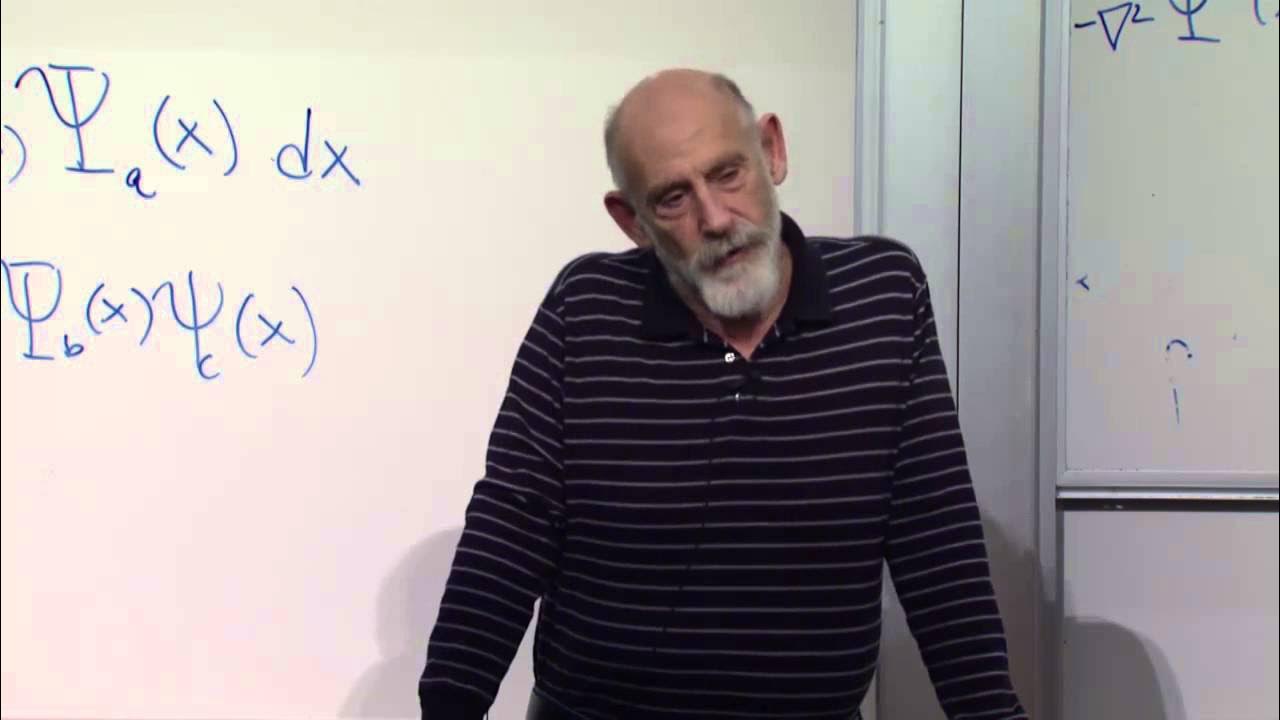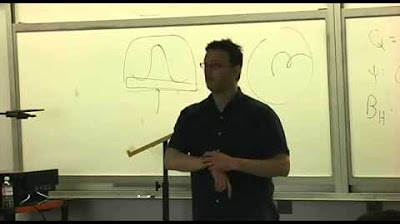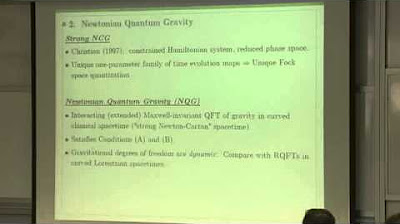Eduardo Martin Martinez: The theory of measuring quantum fields: myths and facts
TLDRThe speaker, a physicist with a keen interest in the philosophy of physics, delves into the complexities of quantum theory, particularly the measurement problem. They explore the limitations of idealized measurements in quantum field theory (QFT), as highlighted by Raphael Sorkin's 1992 paper, and propose particle detectors as a viable alternative for obtaining definite values and updating the state of quantum fields. The discussion also touches on the relativistic nature of quantum information and the challenges of localizing quantum information in space-time.
Takeaways
- 📚 The speaker begins by acknowledging the indigenous peoples' history in the area and invites the audience to learn more about the treaties that shaped the relationship between indigenous peoples and the British and Canadian governments.
- 🌟 The speaker identifies as a physicist with a particular interest in the philosophy of physics, appreciating the insights that can be gained from different perspectives in the field.
- 🔍 The talk focuses on the problem of measurements in quantum theory, highlighting that the measurement problem is still an open issue even without considering relativity.
- 🚫 The speaker discusses the concept of idealized measurements in quantum mechanics and quantum field theory (QFT), noting that such measurements may not be possible in QFT due to issues with causality and the structure of the theory.
- 📈 Raphael Sorkin's 1992 paper is mentioned, which argues against the existence of idealized measurements in QFT, suggesting that they are incompatible with the theory's causal structure.
- 🔬 The Unruh-DeWitt model of particle detectors is introduced as an alternative to idealized measurements, where a non-relativistic quantum system couples locally to a quantum field.
- 🌌 The speaker explains that particle detectors can be modeled as interacting with quantum fields in a way that respects causality and can be used to update our knowledge of the field state.
- 🔄 The concept of a positive operator-valued measure (POVM) is discussed, which provides a way to update the state of a quantum system after a measurement is made, without the need for idealized measurements.
- 🔶 The speaker suggests that the POVMs induced by particle detectors could potentially replace traditional prescriptions in QFT for measurements that yield definite values and update rules.
- 🤔 There is an ongoing discussion about the role of particle detectors in QFT and whether they are necessary for a complete understanding of quantum field measurements.
- 🔍 The speaker concludes by emphasizing that while the use of particle detectors provides a valid measurement theory according to certain criteria, the question of how to concentrate information in a relativistic context remains an open issue.
Q & A
What is the main topic of the speaker's presentation?
-The main topic of the presentation is the problem of measurements in quantum theory, specifically discussing the challenges and implications of idealized measurements in quantum field theory (QFT) and the use of particle detectors as an alternative approach.
Why does the speaker mention the traditional hunting grounds of the Neutral and Other Nations at the beginning of the talk?
-The speaker mentions the traditional hunting grounds to acknowledge the indigenous peoples and their relationship with the land, as well as to provide context about the area where the university is located, following a practice of recognizing indigenous territories at academic events.
What is the speaker's stance on interruptions during talks?
-The speaker encourages interruptions during talks, especially if the audience strongly disagrees with something being said, as they believe in an open exchange of ideas and see themselves as being there to learn as well.
What is the 'measurement problem' in quantum theory?
-The 'measurement problem' in quantum theory refers to the challenge of understanding how and why the act of measurement collapses a quantum system from a superposition of states into a single, definite state.
What does the speaker mean by 'quantum to classical transition'?
-The 'quantum to classical transition' refers to the process by which a quantum system, which is inherently probabilistic, interacts with a measuring device to produce a definite classical outcome, such as a specific value on a measurement device.
What is the significance of Raphael Sorkin's 1992 paper mentioned in the script?
-Raphael Sorkin's 1992 paper, titled 'Impossible Measurements on Quantum Fields,' argues that idealized measurements are incompatible with the causal structure of quantum field theory, challenging the traditional understanding of measurements in QFT.
What is the Unruh-DeWitt model of particle detectors?
-The Unruh-DeWitt model is a theoretical model that describes a particle detector as a non-relativistic quantum system, such as an atom, that couples locally to a quantum field. It is used to understand how measurements of quantum fields can be made in practice.
Why are particle detectors considered a valid alternative to idealized measurements in QFT?
-Particle detectors are considered a valid alternative because they provide a way to measure quantum fields that is consistent with the principles of causality and relativity, and they can reproduce experimental outcomes. They also offer a mechanism to update the state of a quantum system after a measurement is made.
What is the concept of 'localized idealized measurements' and why is it problematic?
-Localized idealized measurements refer to the idea of making measurements that are confined to a specific region of space-time. This concept is problematic because it can lead to violations of causality, as information could be transmitted faster than light, which is not permissible in a relativistic framework.
What does the speaker mean by 'the detector is an alien to this theory'?
-The speaker means that the concept of a particle detector, as a non-relativistic quantum system, is not a native element of the relativistic quantum field theory. It is an external tool brought in to help understand and measure quantum fields within the relativistic context.
What is the relevance of the Redhead theorem to the discussion about particle detectors?
-The Redhead theorem, discussed in the context of the paper 'On the Einstein Podolsky Rosen Paradox,' is relevant because it raises questions about what particle detectors actually detect and whether the concept of particles as ontological entities is valid, which ties into the broader discussion about the nature of measurement in quantum theory.
Outlines
📚 Introduction and Acknowledgement
The speaker begins by thanking the organizers and participants, acknowledging the indigenous peoples of the area, and inviting the audience to learn more about their history and treaties with the British and Canadian governments. The speaker, a physicist with a passion for the philosophy of physics, expresses excitement about the conference format and encourages interruptions for a more engaging discussion. The talk will focus on the measurement problem in quantum theory, which remains an open issue, and the speaker proposes that some measurements can yield definite values, despite the inherent uncertainty in quantum mechanics.
🌌 Quantum Measurements and Idealized Models
The speaker delves into the concept of idealized measurements in quantum mechanics, explaining how measurements are traditionally modeled using the notion of an idealized measurement that updates the state of a system. They discuss the issues and nuances of transitioning from a quantum state to a definite value, such as 42, on a notepad, and how this process is often referred to as the quantum-to-classical transition. The speaker invites the audience to consider the interpretation of quantum mechanics and the challenges it presents in understanding the measurement problem.
🚫 Raphael Sorkin's View on Quantum Field Theory Measurements
The speaker references Raphael Sorkin's 1992 paper, which argues against the existence of idealized measurements in quantum field theory (QFT), suggesting that such measurements are incompatible with causality and the structure of the theory. The speaker provides a historical context and personal experience related to the field of relativistic quantum information, where Sorkin's work has influenced the understanding of measurements in QFT. Two examples are given to illustrate the non-local nature of idealized measurements and their potential conflict with causality.
🔬 The Challenge of Localized Measurements in QFT
The speaker discusses the challenges of localized measurements in QFT, referencing a theorem that suggests localized projectors in a bounded region of space-time cannot be of rank one, implying that idealized measurements, as traditionally conceived, are not possible in QFT. The speaker explores different approaches to addressing this issue, including ignoring the problem, using particle detectors, and considering localized idealized measurements, while acknowledging the controversy and complexity of these approaches.
🛰️ Particle Detectors and Quantum Field Measurements
Introducing the concept of particle detectors as a means to measure quantum fields, the speaker describes how these detectors, as non-relativistic quantum systems, couple locally to a quantum field. They present the Unruh-DeWitt model as a simplified example of such a detector, explaining its Hamiltonian and the unitary evolution it generates. The speaker emphasizes the importance of causality in these models and how the detector's interaction with the field can be interpreted in different ways without violating relativistic principles.
🔄 Causality and Covariance in Quantum Field Theory
The speaker addresses the question of causality in quantum field theory, particularly in the context of particle detectors. They explain that while the Hamiltonian of a particle detector is not a covariant quantity, the predictions of the model are covariant, meaning they do not depend on the reference frame. The speaker also discusses the importance of the detector's coupling to the field being covariant and how this ensures that the theory does not allow for faster-than-light signaling.
🌐 The Role of Particle Detectors in Modeling Quantum Field Measurements
The speaker argues that particle detectors provide a realistic way of modeling the measurement of quantum fields, as they can yield definite values and update rules that respect causality and reproduce experimental outcomes. They suggest that the positive operator-valued measures (POVMs) induced by particle detectors could form a valid measurement theory within QFT, independent of the detectors themselves, and discusses the conditions under which such a theory would be considered valid.
🤔 Philosophical and Practical Implications of Quantum Measurements
The speaker engages in a philosophical discussion about the implications of quantum measurements, particularly the use of particle detectors and the challenges of creating a measurement theory that is both empirically valid and consistent with the principles of quantum field theory. They acknowledge the open questions and ongoing debates within the physics community regarding the nature of particles, the localization of information, and the emergence of classical systems from quantum mechanics.
🔍 Exploring the Consequences of Uncertainty in Quantum Measurements
The speaker explores the consequences of introducing uncertainty into quantum measurements, discussing how this can affect causality and signaling outside the light cone. They examine the impact of using infinite-dimensional projectors and the potential for faster-than-light signaling, highlighting the importance of understanding the update rules on the field when coupling a detector and the non-projection nature of these updates.
📡 The Impact of Detector Models on Quantum Field Theory
The speaker discusses the impact of detector models on quantum field theory, considering the implications of having multiple detectors coupled to the field and how this affects the measurement outcomes. They address the question of whether the choice of observable and the internal dynamics of the detector can change the basic principles of the theory, emphasizing that while the complexity of the model may increase, the fundamental aspects of quantum field theory remain consistent.
🎤 Closing Remarks
The speaker concludes the discussion by acknowledging the complexity and open questions in the field of quantum measurements, particularly the role of particle detectors and the challenges of creating a measurement theory that is both empirically valid and consistent with the principles of quantum field theory. They express gratitude for the opportunity to engage in this exploration and invite further questions and discussion.
Mindmap
Keywords
💡Quantum Theory
💡Measurement Problem
💡Idealized Measurement
💡Quantum Field Theory (QFT)
💡Causality
💡Particle Detector
💡Relativistic Quantum Information
💡Projective Measurement
💡Quantum State
💡Observable
💡Covariance
💡Spectral Decomposition
💡Dipole Coupling
💡POVM (Positive Operator-Valued Measure)
Highlights
The speaker begins by acknowledging the indigenous peoples of the area and their relationship with the British and Canadian governments.
A physicist by training, the speaker expresses his enthusiasm for the philosophy of physics and the opportunity to learn from new perspectives.
The speaker invites interruptions and open discussion, emphasizing the importance of dialogue in the scientific process.
The talk delves into the measurement problem in quantum theory, highlighting it as an unresolved issue even without considering relativity.
A proposal is presented that measurements can yield definite values, despite the uncertainty inherent in quantum mechanics.
The concept of idealized measurement in quantum mechanics is introduced, explaining how measurements update our knowledge of a system.
The speaker discusses the quantum-to-classical transition, questioning the interpretation of measurements and the nature of quantum mechanics.
Raphael Sorkin's 1992 paper is mentioned, which argues against the existence of idealized measurements in quantum field theory (QFT).
Two examples are provided to illustrate the incompatibility of idealized measurements with causality in QFT.
The speaker's field of relativistic quantum information is introduced, with a focus on the relevance of idealized measurements.
A discussion on three approaches to the problem of idealized measurements in QFT is presented, including ignoring the problem, using particle detectors, and localized idealized measurements.
The Redhead theorem is referenced, which has implications for the question of what particle detectors detect and the nature of quantum field observables.
The Unruh-DeWitt model of particle detectors is introduced, providing a simplified model of how quantum fields are measured in practice.
The speaker argues that particle detectors offer a valid measurement theory in QFT, consistent with causality and experimental outcomes.
The potential for replacing idealized measurements in QFT with those induced by particle detectors is explored.
The speaker concludes by suggesting that the use of particle detectors may provide a more complete understanding of quantum field measurement.
Transcripts
Browse More Related Video

Advanced Quantum Mechanics Lecture 9

Discussion: What are the distinctively relativistic features of Quantum Field Theory?

Gordon Belot: The Wave Function for Primitive Ontologists

Advanced Quantum Mechanics Lecture 7

Lecture 2 | New Revolutions in Particle Physics: Basic Concepts

John Bain: Intertheoretic Implications of Non Relativistic Quantum Field Theories
5.0 / 5 (0 votes)
Thanks for rating: